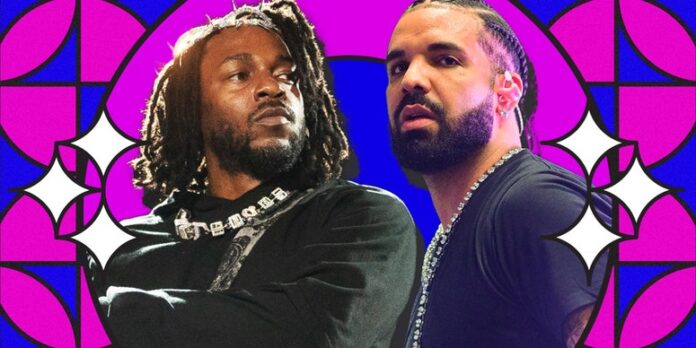On Tuesday, January 14, Drake withdrew his legal action accusing Spotify and Universal Music Group (UMG) of artificially boosting streams of Kendrick Lamar’s “Not Like Us.” A day later, however, Drake newly sued Universal Music Group, in a New York federal court, for defamation and harassment, The New York Times reports.
The simultaneous withdrawal and escalation come less than two months after Drake took multiple legal actions against parties also including iHeartRadio, alleging that various sections of the music industry conspired to make Lamar’s diss track a hit. The withdrawal of Drake’s New York state petition follows a counter-filing from Spotify that unequivocally rejected claims of streaming bumps and called the action a “subversion of the normal judicial process.” UMG also denied the claims. In the new filing, Drake’s company Frozen Moments LLC said it would voluntarily withdraw that action “without costs to any party.”
Nevertheless, the lawyers also make clear that the complaint “is not about the artist who created ‘Not Like Us.’ It is, instead, entirely about UMG, the music company that decided to publish, promote, exploit, and monetize allegations that it understood were not only false, but dangerous.” They continue: “Drake is not a pedophile. Drake has never engaged in any acts that would require he be ‘placed on neighborhood watch.’ Drake has never engaged in sexual relations with a minor. Drake has never been charged with, or convicted of, any criminal acts whatsoever.”
In a statement responding to the lawsuit, a spokesperson for Universal Music Group said:
Not only are these claims untrue, but the notion that we would seek to harm the reputation of any artist—let alone Drake—is illogical. We have invested massively in his music and our employees around the world have worked tirelessly for many years to help him achieve historic commercial and personal financial success.
Throughout his career, Drake has intentionally and successfully used UMG to distribute his music and poetry to engage in conventionally outrageous back-and-forth “rap battles” to express his feelings about other artists. He now seeks to weaponize the legal process to silence an artist’s creative expression and to seek damages from UMG for distributing that artist’s music.
We have not and do not engage in defamation—against any individual. At the same time, we will vigorously defend this litigation to protect our people and our reputation, as well as any artist who might directly or indirectly become a frivolous litigation target for having done nothing more that write a song.
The lawsuit continues by alleging that Universal Music Group undertook a “successful” and “unrelenting campaign” to promote the song, its single artwork (“depicting Drake’s actual Toronto house”), and its music video “as widely as possible.” “UMG did so because it understood that the Recording’s inflammatory and shocking allegations were a gold mine,” Drake’s team contends.
UMG’s campaign, according to the lawsuit, involved helping secure Kendrick Lamar’s spot as the Super Bowl LVI halftime show performer and paying to promote the Grammy candidacy of “Not Like Us.” The song ultimate got five nominations for the 2025 Grammy Awards.
The lawsuit outlines traditional promotional tactics for a hit song, such as marketing and licensing, but also accuses UMG of conspiring with and paying “currently unknown parties to use ‘bots’ to artificially inflate the spread of the Recording on Spotify.” In addition, the lawyers allege that “UMG also offered financial incentives, including direct payments and reduced licensing rates, to various third parties to promote the Recording.”
Drake, according to his lawyers, “confronted UMG about its role in promoting allegations of sexual misconduct lacking ‘the slightest factual basis’ against him,” but the label allegedly “refused to do anything to help.” The rapper also says that he “attempted to address these claims privately with UMG,” but the label apparently “responded that Drake would face humiliation if he brought legal action.”
Further, Drake says he took it upon himself to deny Lamar’s “Not Like Us” claims through his response song “The Heart Part 6.” In the track, “Drake explained that he has ‘never been with no one underage’ and that his name is not on the ‘sex offender list,’” the lawsuit notes.
In a statement shared with Pitchfork, Drake’s legal team at Willkie Farr & Gallagher LLP said: “Drake filed a lawsuit against his label, Universal Music Group, to hold UMG accountable for knowingly promoting false and defamatory allegations against him. Beginning on May 4, 2024, and every day since, UMG has used its massive resources as the world’s most powerful music company to elevate a dangerous and inflammatory message that was designed to assassinate Drake’s character, and led to actual violence at Drake’s doorstep. UMG wants the public to believe that this is a fight between rappers, but this lawsuit is not brought against Kendrick Lamar. This lawsuit reveals the human and business consequences to UMG’s elevation of profits over the safety and well-being of its artists, and shines a light on the manipulation of artists and the public for corporate gain.”
A related action, in Bexar County, Texas, against Universal Music Group and iHeartRadio remains pending. That contained two separate claims: that UMG should have blocked the song’s release, on the basis that it “falsely [accused] him of being a sex offender, engaging in pedophilic acts, harboring sex offenders, and committing other criminal sexual acts”; and that UMG funneled payments to iHeartRadio in a pay-to-play promotional scheme that violates the Racketeer Influenced and Corrupt Organizations (RICO) Act.
This article was originally published on Wednesday, January 15, at 9:38 a.m. Eastern Standard Time. It was last updated on January 15 at 3:53 p.m. Eastern Standard Time.
Source : Pitchfork






